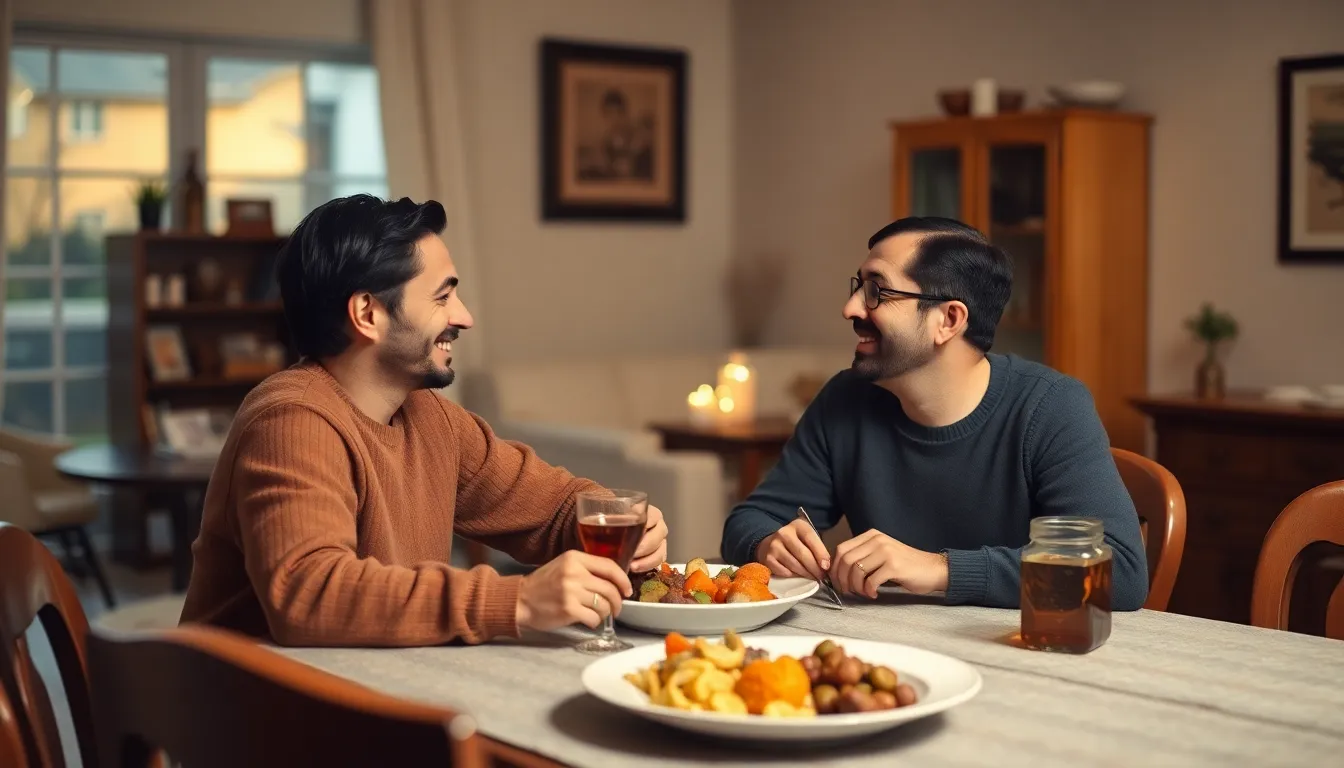Gratitude in relationships isn’t just a warm fuzzy feeling; it’s like the secret sauce that makes love and friendship thrive. Imagine a world where saying “thank you” isn’t just reserved for the last slice of pizza but is woven into the very fabric of daily interactions. When partners express appreciation, it’s like sprinkling a little magic dust that transforms ordinary moments into something extraordinary.
In a fast-paced life, it’s easy to overlook the little things—like the way she always remembers your coffee order or how he tolerates your terrible singing in the shower. But recognizing these gestures can strengthen bonds and create a happier, more fulfilling connection. So let’s dive into the art of gratitude, where a simple “I appreciate you” can turn a mundane Tuesday into a celebration of love and laughter. After all, who doesn’t want to be the reason someone smiles?
Table of Contents
ToggleUnderstanding Gratitude in Relationships
Gratitude plays a crucial role in building and maintaining strong relationships. It fosters emotional connections and cultivates a positive environment for love and friendship.
Definition of Gratitude
Gratitude refers to the appreciation felt for the kindness and support received from others. This positive emotion manifests in various forms, such as thankfulness for small gestures or recognition of sacrifices made by a partner. Acknowledging these acts reinforces bonds and enhances mutual respect. Ultimately, gratitude is about recognizing the value of others in one’s life.
Importance of Gratitude in Relationships
Gratitude significantly enhances relationship dynamics. Feeling appreciated leads to increased satisfaction, fostering deeper emotional intimacy. Regular expressions of gratitude can reduce resentment and misunderstandings, creating a harmonious atmosphere. Studies indicate that couples who practice gratitude demonstrate higher levels of commitment and connection. Relationships built on gratitude tend to be more resilient, helping partners navigate challenges together. Recognizing everyday contributions fosters a culture of appreciation, ensuring both partners feel valued.
The Role of Gratitude in Relationship Satisfaction

Gratitude significantly impacts relationship satisfaction by fostering deeper emotional connections and enhancing resilience.
Enhancing Emotional Connection
Appreciating a partner’s efforts cultivates a stronger emotional bond. Recognizing small acts of kindness, such as making dinner or offering support, encourages partners to feel valued. Gratitude reinforces positive interactions, leading to increased warmth and understanding. Individuals who express appreciation often experience heightened intimacy. Studies show that couples who regularly acknowledge each other’s contributions report greater overall satisfaction in their relationships. By focusing on gratitude, partners create a nurturing atmosphere that fosters emotional closeness.
Promoting Resilience During Conflict
Gratitude plays a crucial role in navigating conflicts. Acknowledging a partner’s intentions, even during disagreements, helps reduce defensiveness. Expressing appreciation can soften tensions and create a mutual space for resolution. Individuals who practice gratitude during difficult times are more likely to find constructive solutions. Data indicates that partners who cultivate gratitude often bounce back more effectively after conflicts. This approach not only promotes understanding but can also transform challenges into opportunities for growth. By prioritizing gratitude, couples build resilience that strengthens their relationship over time.
Expressing Gratitude Effectively
Effective expressions of gratitude strengthen relationships and deepen emotional bonds. Using appropriate verbal and non-verbal methods enhances the significance of appreciation.
Verbal Expressions of Gratitude
Verbal expressions play a crucial role in communicating feelings of appreciation. Simple statements, like “Thank you for your support,” create a positive impact. Frequent compliments about specific actions foster deeper connections, such as praising a partner’s efforts in household chores. Personalizing messages adds effectiveness; phrases like “I appreciate how you listen to me” resonate more. Using a sincere tone transforms appreciation into a heartfelt acknowledgment. In times of conflict, reminding partners of their value reinforces emotional intimacy. Expressing gratitude verbally boosts relationship satisfaction by showing care and attention.
Non-Verbal Expressions of Gratitude
Non-verbal expressions complement verbal appreciation and enhance emotional connections. Gestures, such as a warm smile or a gentle touch, communicate gratitude without words. Small acts like preparing a favorite meal or leaving a thoughtful note also convey deep appreciation. Eye contact during conversations signals genuine interest and acknowledgment. Additionally, body language that mirrors positivity enhances the sentiment expressed. Using these non-verbal cues consistently builds trust and strengthens bonds. Overall, non-verbal expressions reinforce emotional connections, making partners feel valued in the relationship.
The Impact of Gratitude on Relationship Dynamics
Gratitude significantly influences relationship dynamics. It fosters connection and emotional intimacy, which helps couples thrive.
Strengthening Bonds Between Partners
Regular expressions of gratitude strengthen bonds between partners. Partners who appreciate each other’s efforts often experience deeper emotional connections. Simple acknowledgments of daily acts, like preparing dinner or giving support during stressful times, enhance feelings of warmth. Increased warmth leads to greater understanding, which reinforces the relationship. Data suggests that couples who frequently express gratitude report higher levels of overall satisfaction. They become more committed to each other, creating stronger ties that withstand challenges.
Fostering a Positive Relationship Environment
Gratitude fosters a positive environment in relationships. Acknowledging each other’s contributions cultivates a sense of safety and acceptance. Couples who practice gratitude create spaces where vulnerability is welcomed. Conflicts become constructive rather than hostile when partners appreciate each other’s intentions. During disagreements, recognizing the value of a partner can lower defensiveness, paving the way for effective communication. Enhanced positivity nurtures resilience, allowing relationships to bounce back from setbacks effectively. Ultimately, gratitude transforms moments of tension into opportunities for growth and connection.
Gratitude is a powerful tool that can significantly enhance relationships. By regularly expressing appreciation for one another, partners can create a nurturing environment that fosters emotional intimacy and resilience. Acknowledging even the smallest gestures cultivates warmth and understanding, which are essential for building strong connections.
In times of conflict, gratitude can transform challenges into opportunities for growth, allowing partners to navigate disagreements with greater ease. Ultimately, embracing gratitude not only deepens bonds but also leads to a more fulfilling and satisfying relationship. Prioritizing appreciation ensures that both partners feel valued and supported, paving the way for lasting love and friendship.



